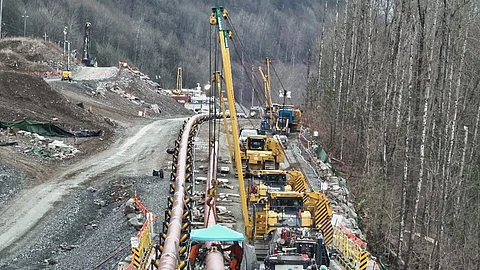

It took longer to put in the ground.
But after just a year in service — and just in the nick of time — the much maligned, delayed and over-budget Trans Mountain pipeline is looking to expand by nearly 30%.
The taxpayer-owned company, announced this week it is looking to add as much as 300,000 barrels per day (bpd) of additional capacity, bring total takeaway close to 1.2 million bpd or almost a quarter of Canada’s available barrels even as the federal government preps it for possible sale.
Rather than build a whole new pipe, it would consist of so-called ‘looping’ and adding oil additional thinners to make the heavy oil flow easier and faster by reducing drag in the line. Upgrades to the Port of Vancouver will also increase the number of ships that can be loaded to 30 Aframax tankers per month, up from the current 24.
The added bonus is that those are barrels that could eventually wind up in Asia, bypassing looming US tariffs, according to vice-president Jason Balasch.
“I think there's a lot of Asian markets that we could access,” Balasch told Reuters. “Our system isn't full and we're confident we can operate it to its maximum,” he added.
Yet, despite its strategic importance, the project has been a staggering financial burden, with costs ballooning nearly five-fold to $35 billion, leaving taxpayers on the hook as the government prepares for a possible sale.
While the pipeline has diversified Canada’s export options, its completion came at an extraordinary cost. Originally budgeted at $7.4 billion, the Trans Mountain expansion ended up costing taxpayers nearly $35 billion, making it one of the most expensive infrastructure projects in Canadian history.
The federal government, which nationalized the project in 2018 to ensure its completion, now faces mounting pressure to offload it — potentially to a coalition of Indigenous and First Nations groups interested in ownership.
Before any sale can take place, hearings before the Canada Energy Regulator (CER) later this year will determine who should shoulder the financial burden of the cost overruns. The question remains: will oil shippers be forced to absorb the added expense, or will taxpayers remain on the hook?
And more important, how will that affect its market value? Its strategic value is already clear.
These tankers, which typically carry up to 800,000 barrels, are currently restricted to 550,000 barrels per load due to draft limitations. The new navigation aids will allow nighttime travel for unloaded vessels, reducing logistical bottlenecks.
Meanwhile, a new Angus Reid poll is touting strong support for new pipelines running from sea-to-shining sea in all parts of the country.
According to the survey, conducted after US president Donald Trump announced -- and rescinded -- tariffs on Canadian oil exports, nearly four in five people either 'agree' or ‘strongly’ agree Canada needs more energy infrastructure, including 76% in British Columbia and even 74% in Quebec. That compares to 89% in Alberta and 86% in Saskatchewan, respectively.
With its costliest hurdles behind it, Trans Mountain is finally fulfilling its role as a key export route beyond the US. However, the pipeline’s financial overrun casts a long shadow over its future. The upcoming hearings on who pays the bill could shape the terms of its eventual sale, particularly if Indigenous groups emerge as frontrunners for ownership.
For now, the pipeline is flowing, the tankers are lining up, and Canada’s oil is reaching new shores. But the financial and political battles over Trans Mountain are far from over.
“It doesn’t matter what the product is, we should be looking at how we get that product to other markets. Now, for pipelines, those projects — even expedited — are going to take years to put in place,” no less an ally than BC Premier David Eby told reporters.
“If you’re not buying oil and gas from Canada and British Columbia, the alternative is Venezuela.”
